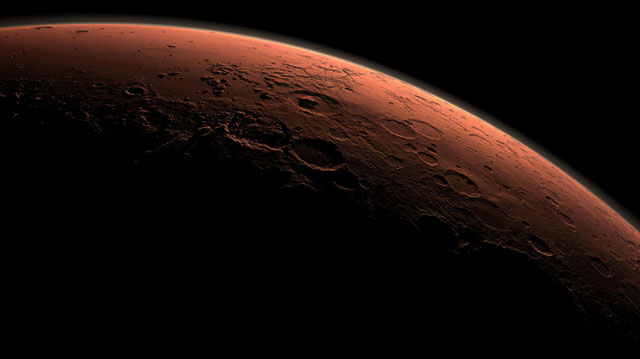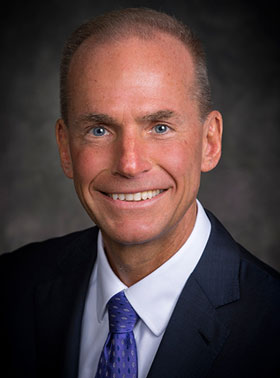
Boeing once helped the US beat the Soviet Union in the race to the moon. Now the company intends to go toe-to-toe with newcomers such as billionaire Elon Musk in the next era of space exploration and commerce.
Boeing CEO Dennis Muilenburg sketched out a Jetsons-like future at a conference on Tuesday, envisioning a commercial space-travel market with dozens of destinations orbiting the Earth and hypersonic aircraft shuttling travellers between continents in two hours or less. And Boeing intends to be a key player in the initial push to send humans to Mars, maybe even beating Musk to his long-time goal.
“I’m convinced the first person to step foot on Mars will arrive there riding a Boeing rocket,” Muilenburg said at the Chicago event on innovation, which was sponsored by Atlantic magazine.
Like Musk’s SpaceX, Boeing is focused on building out the commercial space sector near Earth as spaceflight becomes more routine, while developing technology to venture far beyond the moon. The Chicago-based aerospace giant is working with Nasa to develop a heavy-lift rocket called the Space Launch System for deep space exploration. Boeing and SpaceX are also the first commercial companies Nasa selected to ferry astronauts to the International Space Station.
Musk last week welcomed competitors as he unveiled a SpaceX craft that would dwarf the workhorse of Apollo missions of a half-century ago, hauling 100 travellers to Mars with cruise-ship-style amenities.

“The goal of SpaceX really is to build the transport system. It’s like building the Union Pacific railroad,” Musk told a space conference, as he laid out a plan to bring travel to Mars to a mass market with tickets priced one day as low as US$100 000.
Boeing built the first stage for the Saturn V, the most powerful US rocket ever built, which took men to the moon. Nowadays, Muilenburg sees space tourism closer to home “blossoming over the next couple of decades into a viable commercial market”. The International Space Station could be joined in low-earth orbit by dozens of hotels and companies pursuing micro-gravity manufacturing and research, he said.
“I think it’s a fascinating area for us,” he said.
Muilenburg said Boeing will make spacecraft for the new era of tourists. He also sees potential for hypersonic aircraft, travelling at upwards of three times the speed of sound.
Science fiction
Boeing and Lockheed Martin are among the space heavyweights developing experimental aircraft that could fly US travellers at speeds right out of a science fiction movie.
Lockheed’s Falcon Hypersonic Technology Vehicle 2 is being designed to zip through the sky at Mach 20 (about 21 000km/h), flying between New York and Los Angeles in 12 minutes. Boeing’s X-51A WaveRider, which relied on its own shock waves for compression lift, reached Mach 5.1 in 2013.
Costs will need to drop substantially before these experimental spacecraft can be seriously considered for commercial use, Muilenburg said.
“That business model isn’t closed yet. At some point it will,” he said. “The future of innovation has to include not only the technology, but economic viability.” — © 2016 NewsCentral Media

